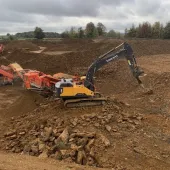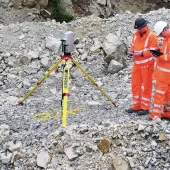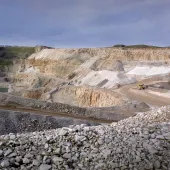Development and Launch of the UK Minerals Strategy

First published in the November 2018 issue of Quarry Management as Shaping the Strategy
Nigel Jackson, chief executive of the MPA and chair of the CBI Minerals Group, discusses the background to the development and recent launch of the UK Minerals Strategy
There remains widespread ignorance generally, but more worryingly both within and around government, of the continuing importance and economic contribution of the UK minerals and mineral products industries. Not of oil and gas, which has tended to dominate such awareness as there is, nor of ‘fracking’, which is currently generating more emotion than energy, but of the non-energy minerals and mineral products sector which is essential to construction, manufacturing and the economy, ie aggregates, cement, concrete, asphalt, agricultural and industrial lime, clays and silica sands, fluorspar, barytes, potash etc.
The recent publication and launch of the UK Minerals Strategy (UKMS) is an industry-led response, not only designed to raise awareness of the industry and its contribution to the economy and our way of life, but also to bring the industry together to shape a common approach and ensure sustainable supplies for the next 25 years.
As an economy that is dependent upon 1 million tonnes per day of minerals and mineral products, supply cannot be assumed: it needs planning, monitoring and managing. The mineral planning system carries most of the burden for converting planning applications for new mineral sites into production. These days this is a ‘localist’ process, following the demise of regional strategic planning and its more ‘top-down’ ‘predict-and-provide’ approach. Whether this is a robust and appropriate basis on which to meet demand for the biggest material flow in the economy going forward is an open question. Current replenishment rates, particularly for aggregates, which represent over 80% of our mineral needs, have been languishing at around or below 60% for more than 10 years. Alarm bells should be ringing, given that it can take anything from 10 to 15 years to move from exploration to production.
The UKMS anticipated the Government’s own emerging Industrial Strategy and the link it would have to the new Construction Sector Deal. It also informed a robust industry response to the recent review of the National Planning Policy Framework (NPPF) by ensuring that the force and purpose of the Minerals Chapter remained largely intact. This was important, as the NPPF effectively crystallizes the industry’s ‘licence to operate’, recognizes the essentiality of its products and the need to ensure a steady and adequate supply of minerals to meet societal demand, which the industry estimates to be more than 5 billion tonnes over the next 25 years.
The development of the Strategy by industry has been a unique process and has taken around 25 years, if you trek back to the ‘initial frustration’! Encouragingly, the new Strategy is already attracting support from non-industrial organizations related to, and with a legitimate interest in, the industry.
The trigger
In 1993 a number of geologists, mineral planners, consultants and lawyers who formed the then CBI Mineral Committee decided ‘enough is enough’. Frustrations with the planning and permitting system were raw and it was concluded that the industry had to get its ‘act together’ if it was to survive and prosper and the economy was to continue to receive sustainable supplies of the minerals it needs at the right level and the right rate.
The committee published ‘Living with Minerals’, which was the first attempt to set out the scale, importance and nature of the industry, and to make the link between minerals and their end use. The cut-away of the minerals and mineral products used in a typical home remains emblematic of the case that was being made.
But knowing a problem existed was the easy part. Developing a solution is what has taken the time. A number of important steps needed to be taken to enable the industry to put itself into the right shape and condition to facilitate informed and evidence-based dialogue with the right stakeholders to identify the way forward.
In summary, the industry needed to organize itself, engage with others, debate key issues, put its ideas together, consult and conclude. This has largely taken place over the last 10 years.
The response
Critical to developing a response to the initial frustration has been the role played by the CBI Minerals Group in bringing together 99.9% of the industry, in concert with the Mineral Products Association, which, as the largest sectoral trade association, representing over 90% of the UK mineral products industry, has the resources to help deliver solutions. Having all the industry ‘in the room’ has been vital in developing a coherent strategy to maintain and strengthen the sector’s ‘licence to operate’.
The industry recognized that while ‘talking to itself’ is important, it needed a means to engage with its key stakeholders. Consequently, it took another bold step and formed the UK Minerals Forum (UKMF) in 2007, which, although funded by the industry, is independently chaired and brings together the planners, NGOs, and representatives from government and its agencies in Scotland, Wales and Northern Ireland, to debate important and often controversial issues in ‘a safe place’. Over the years the Forum has produced consensus reports on skills, planning, mineral resources and horizon planning, and has helped build trust between industry and its stakeholders.
In parallel, six ‘Living with Minerals’ conferences since 2004 have helped identify key issues which would be necessary to shape a credible strategy. The conferences have attracted tremendous support from key players in industry, environmental and regulatory organizations.
These processes led to, or influenced, the publication of three important documents between 2014 and 2016:
- House of Commons Select Committee Investigation into the Extractive Industries Sector, November 2014 – this endorsed the development of a strategy for the industry, which, in turn, was supported by government in January 2015
- UK Minerals Forum report ‘The Future of our Minerals’, November 2014 – examined recent trends in production and also ‘looked forward’, recommending the development of a long-term vision and strategy for UK minerals supply
- CBI Minerals Group report ‘The UK Minerals Extraction Industry’, February 2016 – which quantified the economic contribution of the industry.
These outputs collectively enabled and motivated the industry to keep moving forward and increased enthusiasm and determination to finally convert years of preparation and dialogue into a UK Minerals Strategy.
Industry representation in the BEIS-hosted Extraction Industry Transparency Initiative (EITI) and successive publications from the Mineral Products Association on the facts and profile of the mineral products industry have all also helped reinforce the context and facts about the industry.
The Strategy
Following a formal stakeholder consultation process in 2016/17, this year’s 6th ‘Living with Minerals’ conference saw the launch of the first ever UK Minerals Strategy, which, significantly, attracted support from the industry’s sponsoring government Minister, Richard Harrington MP, at BEIS. The aim of linking the UKMS to the Government’s own ambitions for the industry and the economy has now been recognized, which is both satisfying and welcomed. The effort to date has been worth it, although, ridiculously, it still feels like the ‘end of the beginning’!
The aim of the strategy is ‘to ensure that UK demand for minerals and mineral products is supplied sustainably for the next 25 years. This will require identifying and permitting at least 5 billion tonnes of mainly construction and industrial minerals to be sourced primarily from indigenous sources.
‘Of overriding importance is the requirement for a strong national minerals and mineral products policy and statement of need. These would inform and underpin national, regional and local planning to enable sufficient minerals and mineral products to be supplied to key sectors of the economy.’
These simple but cogent statements provide the starting point to roll out the Strategy and initiate the next phase of work. Implementing any strategy is never easy, so the UKMS has been constructed around the three main building blocks of sustainable development. Within these, three areas of work have been identified, creating the ‘nine key building blocks’ of the Strategy. This classic ‘nine-box’ approach creates the opportunity to build bespoke communities of interest to ensure manageability and affordability.
The nine key building blocks of the strategy are:
- Economic – Demand & Importance, Supply & Distribution, Trade & Investment
- Environmental – Planning & Regulation, Environmental Benefits, Environmental Impacts
- Social – Education, Skills & Employment, Public Understanding & Engagement, Research & Innovation.
The process of prioritization is in hand and work on the first three building blocks will start soon, and it is hoped the UK Minerals Forum can continue to play an active role, as well as developing new clusters of expertise.
Given that mineral extraction is a long-term business, where lead-in times for planning and permitting to production can typically take up to 10 to 15 years, the timelines for completion of work on all ‘nine key building blocks’ needs to be around three years given that the strategy underpins supply ambitions for the next 25 years.
The purpose of the Strategy is multi-layered from the political to the operational, but it is hoped that in addition to awareness raising and ‘making the link’ between our mineral resources and their end use, it will support selling the need and importance of our industry to the next generation. Too many still assume that, with the decline of coal, we are no longer a mining country and do not think about where the essential materials for construction and manufacturing come from and how they are delivered. We undoubtedly remain very active with more than 2,000 extraction, processing and production sites onshore and offshore using ports, wharves, rivers, canals and the rail network. Activity spans construction and industrial minerals with recent tungsten and planned polyhalite operations in Devon and in Cleveland, respectively, and active interest in tin, gold and lithium all testifying to the potential that still remains.
As the UKMS states, ‘the UK has abundant and diverse mineral resources and a resilient and productive industry that is committed to supplying both indigenous demand and valuable export markets […which will] continue to provide attractive career opportunities and meet skills needs for a modern, healthy, safe and well-educated and diverse workforce and encourage people to choose to work in the industry’.
The industry hopes that the UKMS will be seen as this generation handing the baton to the next, to ensure that this great industry continues to thrive for the good of the economy and our quality of life.
- Subscribe to Quarry Management, the monthly journal for the mineral products industry, to read articles before they appear on Agg-Net.com








